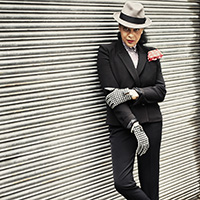Two Tone: "Three Minute Heroes"
How did Coventry's Ska scene change Britain?
Panellists
|
Pauline Black Her career spans acting (Time Out Award for Billie Holiday portrayal @ Tricycle Theatre, London) TV presenter- (Black On Black, Channel 4) radio broadcasting (Black to The Future, BBC Radio 5 Live, Radio 4 Pick Of The Week, With Great Pleasure, BBC6musicDJ) & author - her best-selling memoir “Black By Design” was published by Serpent’s Tail on July 14th 2011 & in USA on June 4th 2012. She continues to tour internationally with The Selecter - most recently in support of their new official chart album ‘Subculture’ released on June 15th 2015. |
 |
| Trevor McCrisken Associate Professor, Politics and International Studies at the University of Warwick, who has published work on politics and popular culture |
|
| Horace Panter Horace is a member of The Specials. His influences are diverse and range from the Pop Art paraphernalia of artists such as Peter Blake, Andy Warhol and Robert Indiana to the depictions of light in paintings by Edward Hopper and David Hockney. His ‘Americana’ series falls into the latter category; his reimagines the ubiquitous signs/diners in American cities as iconographic cultural symbols. Ultimately, he says that these works ‘are about painting light’. His giant ‘cassette’ paintings, on the other hand, fit into the Pop Art genre, with an emphasis on the cassette itself as an icon in terms of its place in musical and cultural history. Each one represents a band/song which has stood the test of time and become a classic in the pop genre and the recording studio in which it was produced. Many of those studios no longer exist so each cassette is meticulously researched to give accurate information. This series started when he was commissioned to design a Christmas card for Teenage Cancer Trust. Having just found a box of old cassettes (including some old recording sessions by The Specials) he drew his first cassette with the title ‘Christmas Songs’. This particular card was a hit and sold out within weeks of its release. In his ‘Icon’ series, Horace has included a number of portraits including one of Amy Winehouse which was commissioned by The Amy Winehouse Foundation and one of Billy Wright (Captain of Wolves FC and England in the 60’s who is only one of 8 footballers to have won more than 100 caps for the England team). This was auctioned by Club Wembley with proceeds donated to Teenage Cancer Trust. Although most of his career has been defined by music (as the bass player in The Specials), Horace graduated in 1975 with a degree in Fine Art from what was then called the ‘Lanchester Polytechnic’ in Coventry (now Coventry University). It was there that he first met Jerry Dammers and the concept of the punk/ska band materialised. He has been exhibiting in the UK since 2009 and in 2015 will be taking work to Los Angeles and New York for the first time. His original paintings and limited edition fine art prints are available through a hand-picked selection of galleries. Prints can be purchased online. |
 |
|
Jason Toynbee |
|
| Catriona Troth I was an undergraduate at Warwick in the School of Applied Maths from 1976-79, and a post-graduate in the Control Theory Centre of the Department of Engineering from 1980-83 – not the most obvious background for a novelist. I never forgot the sense of growing tension in the city during the spring and early summer of 1981. As a student, I was insulated from much of what was going on, but I remember the palpable fear, as riots spread across the country, of what could happen if they came to Coventry. And yet they never did. Twenty years later, I began to research the events of that year. The story I uncovered was extraordinary – a city riven with violence that found a way to heal itself, in part through music. It took me 14 years, but my concept of how that happened distilled itself into a novel, Ghost Town. The process of writing the book has taken me away from a 25 year career as a researcher in Air Traffic Control into a whole new world. I am now a freelance writer, a regular contributor to Words with Jam Magazine and a member of the Triskele Books author collective and of the Alliance of Independent Authors. |
 |
| Alwyn Turner Alwyn W Turner is a writer of British cultural history. His books include an acclaimed trilogy on the last decades of the 20th century: Crisis? What Crisis?, Rejoice! Rejoice! and A Classless Society. In other books he has covered the story of the Biba shops, the early years of rock ’n’ roll, the work of Terry Nation and the world of Portmeirion. |
|
